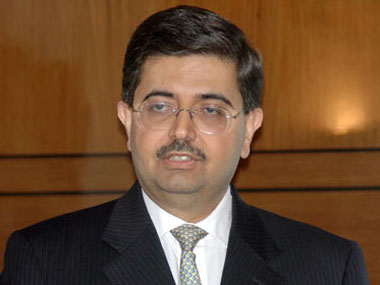New Delhi: Warning of ‘more bad news’ on the stressed loans front in the Indian banking sector, eminent banker Uday Kotak has said its ‘weak underbelly’ has resurfaced strongly and the story is not over yet, though lenders have begun cleaning up their books. [caption id=“attachment_600796” align=“alignleft” width=“380”]  Kotak Mahindra Bank chief Uday Kotak[/caption] Kotak also questioned whether nationalisation of banks served the purpose of checking disproportionate lending to big businesses, as most of the stress on their books is today due to loans to big corporates. In his annual message to shareholders, the Kotak Mahindra Bank chief also pitched for an ’exit mechanism’ for the sector, saying forced mergers, as practiced in past, may not be possible for public sector banks anymore due to their huge NPAs. Kotak, who is known as one of the most vocal voices within the Indian banking industry including about its own perils, said he sees a “well-settled government” in the country today, but it “could do more to build confidence and trust among businessmen and rekindle animal spirits into the economy”. “The last financial year saw the Indian economy stretched between two ends of the string, good macro tailwinds but a difficult micro situation,” he said, adding that inflation, current account and fiscal deficit were all under control, but many sectors and individual businesses struggled. “This scenario is likely to change from hereon. With Brent recovering to USD 50 levels, the benefits of lower prices will reduce, and this has the potential to increase our current account deficit and bottoming out of inflation…. It is time for the Indian micro to gear up and get back into the game,” he said. On banking sector, Kotak said, “The weak underbelly of Indian banking, something which I have been consistently pointing out through the years, has resurfaced strongly. Both public and some private sector banks have revealed stress on their balance sheets. “The story is not over yet, and we can expect to see more bad news on this front. But it is also a fact that banks have started cleaning up their balance sheets.” Among the lessons from the problems in banking sector, Kotak said banks should understand they are not private equity investors and recovery of money should be at the heart of lending. “Return of capital is more important than return on capital. If banks think they cannot recover money, they should not lend in the first place,” he said, while suggesting a serious overhaul of the recovery mechanism in the country. He also blamed the banks for ‘postponing the pain’ for the last many years, saying it has had a ballooning effect on exposures. Kotak further said, “Banks were nationalised 47 years ago. One of the reasons for this was that private banks were lending disproportionately to big businesses. Access to funds from banks was not easy for the common man. Nationalisation was supposed to change this. Today’s irony is that the biggest losses booked by banks, including public sector banks (PSBs),are on account of lending to big businesses. “Effectively, public policy actions supposedly done ‘in public interest’, are instead going ‘against public interest’.” Going ahead, Kotak said, the Bankruptcy Code is a good step but it will take at least a year to become fully effective as the entire ecosystem needs to be created. “When I look at our challenges across BIFR, SARFAESI, DRTs, DRATs, and the judicial system, I hope we do better this time. Good intent needs to be backed by good people and execution. Simultaneously, the country needs to rethink the architecture of Indian banking boldly,” he said. He warned that the economy could face headwinds because of banking capacity constraints, given its dependence on 70-30 mix between public and private sector banking. Kotak also said that technology is changing the contours of banking while at the same time the sector has been opened up and new players will soon open shop. “In a short time, we are likely to see 20 to 30 new banks between payment banks, small finance banks, and new on-tap banks. There will be many more new banks than before, and while this is good for capacity building, it will come with its issues. “In India we still do not have an exit mechanism for banks. Whenever there was a problem, the policy makers chose to merge the troubled entity with another bank, in most cases a public sector bank (PSB). Now PSBs are no more in a position to absorb such entities easily because of the high non-performing assets (NPAs) which have put their capital under severe strain. In this context, the banking industry needs a defined framework, where easy entry is accompanied by an exit mechanism. “The entire banking sector therefore needs to be reconfigured and re-engineered. This requires political will and consensus which is not easy,” Kotak said. He exuded confidence in growth prospects of his own bank, as also about insurance and mutual fund businesses, and said the integration of ING Vysya Bank would be completed this month. “Another area of focus for us going forward is the area of analytics. We are gearing up the organisation for increased intelligence, speed of response and increased productivity on asset, liability, and services areas,” he said.
Kotak also questioned whether nationalisation of banks served the purpose of checking disproportionate lending to big businesses.
Advertisement
End of Article


)

)
)
)
)
)
)
)
)



